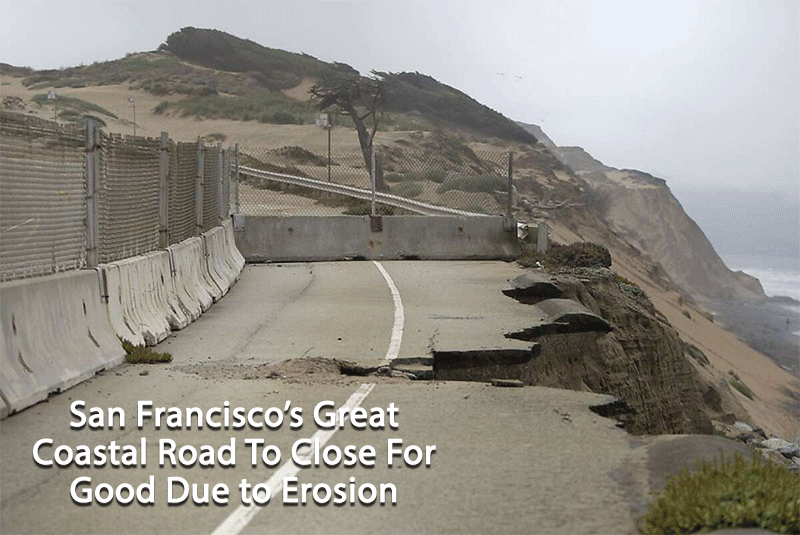San Francisco Will Close Coastal Highway…
Rapidly rising sea levels are driving San Francisco’s decision to close a mile of the Great Highway – its iconic coastal road – in a high profile move known these days as “managed retreat.” The asphalt sections that comprise the roadway have crumbled so many times due to extreme storms and rising tides that it has been deemed no longer possible to maintain the highway.
More threatening than the crumbling road itself is a 14-foot-wide major sewer pipe running under the roadway that carries wastewater to a nearby treatment facility. If this is not dealt with, it is only a matter of time before a major spill.
The ocean in this area is expected to rise 1 – 2 feet in the next three decades. The City is also planning projects to protect flood prone tech headquarters and the airport, which sticks out into the Bay like a sore thumb.
.

…But Mexican Resort Region Not Quite Ready to Face the Inevitable
A thousand miles southeast, resorts on the Caribbean coast of Mexico face a similar existential challenge. Rising sea levels and unprecedented storm events threaten Quintana Roo’s coastline, known for its white sand beaches. The 700-mile coast of Mexico’s Quintana Roo has been eroding at a rate of 4 ft a year, with up to 16 feet a year washing away in some sections. Beaches are disappearing, maintained artificially with sand dredged from the sea bottom and transported to the coast. As beaches disappear, the sea moves in to create scenes of waves breaking against the walls of swimming pools, restaurants and houses.
In addition to the ongoing erosion of the beaches, warming seas and changes to ocean chemistry are driving a mass incursion of nasty algal blooms. Ten ft high mounds of rotting black seaweed often greet tourists on the resort strip, an emperor’s new clothes scenario that few want to discuss…especially the corporate owners of new resort properties.
Many long time residents on the coast understand that the writing is on the wall, but, as is the case with climate emergency everywhere, most are holding on in the hope that the situation will reverse itself.
But it won’t.
In the meantime, hundreds of places around the planet have concluded that pulling back from the coast is far more sensible and realistic than attempting to fight the inevitable with extraordinarily expensive concrete and steel infrastructure projects that are ultimately doomed to failure.
As the futility of fighting sea level rise around the planet slowly begins to sink in, we are following high profile projects in Virginia, New York, Louisiana and the United Kingdom.